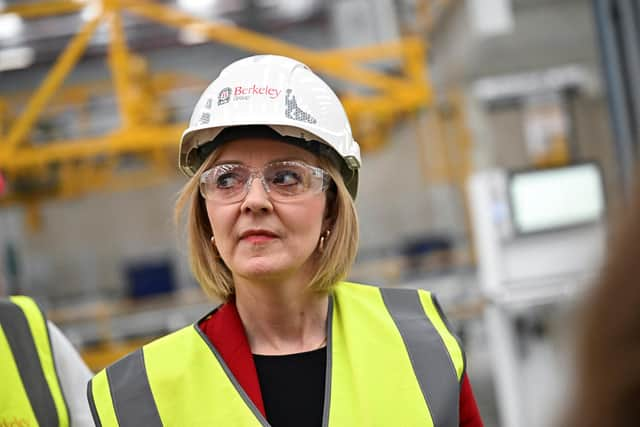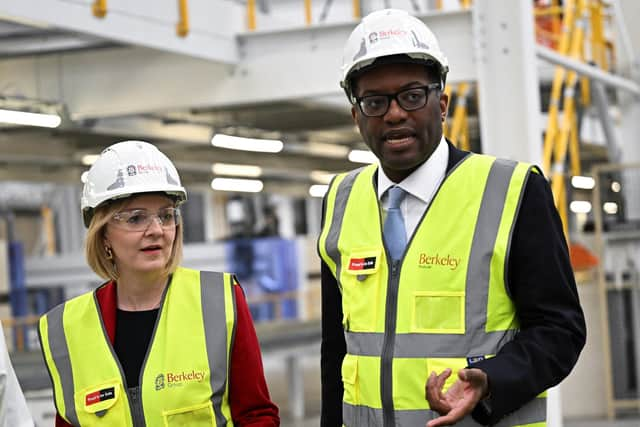Why voters have been outraged by chaos surrounding the mini-budget -Greg Wright
"The lady's not for turning" was a phrase which came to epitomise Margaret Thatcher's approach to leadership and her determination to avoid the humiliating U-turns of Ted Heath's administration, which many Tory activists regarded as a terrible betrayal.
It's hardly surprising that Liz Truss - a newly appointed Tory Prime Minister who faces a sea of economic troubles - is invoking Thatcher's spirit as she motors onward with policies which have been widely derided. Thatcher might have sympathised; in 1981 even the CBI's director general, who should have been a natural ally, denounced the Government's economic policies in strident terms.
Advertisement
Hide AdAdvertisement
Hide AdThe question, of-course, is whether Ms Truss and Kwasi Kwarteng have kicked the ball into their own net and created a crisis through a rash mini-budget which failed to anticipate the market reaction. By refusing to acknowledge the consequences of their actions and contemplate the possibility of a U-turn, they may well have made a bad situation much worse.
Under pressure, Thatcher displayed fearsome passion and eloquence. The Prime Minister's lacklustre performance on a host of local BBC Radio interviews this week, which were punctuated by painful pauses, did not appear to provide a clear path out of the crisis.
People are willing to stick with an unpopular leader, but only if they believe there is a coherent strategy which could lead to better days. Ms Truss' faltering and repetitive performance suggests that such a strategy does not exist, or if it does, she is struggling to explain it in plain English.
Even less forgivable, is the PM and Chancellor's failure to consult widely before making the announcements which have so "spooked" the markets.
Advertisement
Hide AdAdvertisement
Hide AdThe measures revealed in the mini-budget were so sweeping that they should only have been announced after an appropriate period of analysis and reflection, with dissenting voices invited around the decision-making table.


The new administration is, after all, only a few weeks’ old. It wouldn’t have hurt to spend a little more time contemplating the potential market reaction.
Thatcher, who loved the cut and thrust of argument, was always willing to listen to logical, reasoned objections, even if she gave the impression in public of being fixed on a course that could never be changed.
The decision of the Prime Minister and the Chancellor to meet with the Office for Budget Responsibility (OBR) – a body created 12 years ago in a bid to bring transparency to public finances – is a classic example of a stable door being closed long after the horse has bolted.
Advertisement
Hide AdAdvertisement
Hide AdThe meeting with OBR chair Richard Hughes was the latest effort by Ms Truss and Mr Kwarteng to reassure markets and voters that the economic turmoil of recent days is under control, after days of chaos in the financial markets and fears of rocketing mortgage bills were triggered by the Chancellor’s disastrous mini-budget last week.


It prompts an obvious question. Why wasn’t this meeting held before plans for the mini-budget were finalised?
The Chancellor – and Prime Minister – must explain why the mini-budget was delivered without an up-to-date forecast from the OBR, after the OBR revealed that it had prepared a draft forecast for the new Chancellor on his first day in office.
Quite reasonably, the lack of such a forecast caused jitters in the City after the Chancellor’s announcement, and may at least partly explain the turmoil of the past week. The bland statement issued after the meeting, which stated the Prime Minister and Chancellor will “work closely” with the OBR, was simply inadequate.
Advertisement
Hide AdAdvertisement
Hide AdSome MPs had expressed a hope that the meeting could mark the start of a process to win back the confidence of the markets, after the £45 billion tax-cutting package announced by the Chancellor plunged the pound to historic lows and forced the Bank of England to intervene to calm the markets.
The Bank launched an emergency government bond-buying programme to prevent borrowing costs from spiralling out of control and stave off a “material risk to UK financial stability”.
Chair of the Treasury Select Committee Mel Stride, one of the growing number of Conservatives with deep reservations about the Government’s plans, is hoping for a “reset moment”, echoing earlier calls from fellow Tory MPs for a “plan B” from the Government.
Despite the growing unease, both the Prime Minister and Chancellor have said they are still committed to the economic plan, arguing that their package of tax cuts is the “right plan” for the economy.
Advertisement
Hide AdAdvertisement
Hide AdThis turmoil is not simply a matter for the Westminster bubble or the City. The plans outlined by the Government in the mini-budget have real world consequences. Voters aren’t stupid. Since the mini-budget, Labour has roared ahead in the polls to almost unprecedented heights.
To quote a Tweet from Robert Peston, ITV News' political editor: “If the YouGov prediction of a Labour majority of close to 350 is anywhere near true, one explanation is that voters are incandescent about how the mini budget led to soaring market interest rates, soaring mortgage rates and a potential house price slump.”
Some of the greatest leaders in history have been bold contrarians who refused to be swayed by swift changes in public opinion. But a willingness to challenge convention must be matched by a clear understanding of the likely long term consequences of your actions, a mastery of detail and a willingness to listen. Such qualities seem to be in short supply inside Downing Street today.